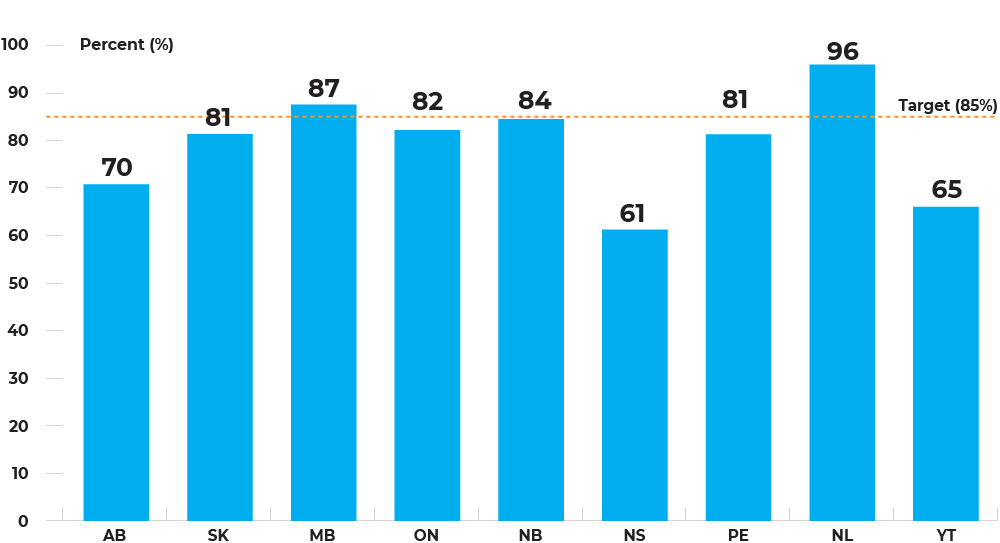Follow-up colonoscopy rate
Why is this important? The effectiveness of a screening program requires that people with an abnormal fecal test complete the appropriate diagnostic follow-up with colonoscopy so that the next steps can be taken to optimize their outcomes. Monitoring this indicator provides important information to plan strategies to improve follow-up.
Indicator definition: The percentage of people with an abnormal fecal test who have a follow-up colonoscopy within 6 months.
Target: ≥ 85% of people return for colonoscopy within 6 months
Indicator calculation:
Numerator: The number of people with an abnormal fecal test lab result who had a follow-up colonoscopy within 6 months of the date of the abnormal lab result.
Denominator: The number of people with an abnormal fecal test lab result within the measurement timeframe.
How does 2017/18 compare to 2013/14? Compared with data in the colorectal cancer screening report for 2013-14 when follow-up colonoscopy uptake was 62.9 – 82.8%, follow-up colonoscopy uptake has increased in most jurisdictions in 2017/18.
Percentage of colonoscopy uptake within 6 months of abnormal fecal tests among individuals aged 50-74, by jurisdiction, screening year 2017 to 2018

Text description and footnotes
Follow-up colonoscopy uptake within six months ranged from 61.0% in Nova Scotia to 95.8% in Newfoundland and Labrador. Manitoba (87.2%) and Newfoundland and Labrador (95.8%) reached the target of 85%, and New Brunswick falls just outside the target at 84.5%.
Additional considerations: When interpreting this indicator, it is important to consider that colonoscopy uptake is not only influenced by patient choice, but also by wait times. People who have a follow-up colonoscopy more than 6 months after an abnormal fecal test are not captured in this indicator.
COVID-19 considerations
![]() Follow-up colonoscopy rates declined during the COVID-19 pandemic as non-emergent health services were paused or reduced.1 Follow-up colonoscopy rate is an indicator that colorectal cancer screening programs will need to monitor closely during COVID-19 pandemic recovery to ensure that screening participants have access to timely follow-up colonoscopy services as backlogs are reduced. Fewer people returning for a follow-up colonoscopy within 6 months of an abnormal fecal test will lead to more people being diagnosed with colorectal cancer at later stages, which will impact downstream cancer services such as increasing cancer surgeries and the cost of treatment.
Follow-up colonoscopy rates declined during the COVID-19 pandemic as non-emergent health services were paused or reduced.1 Follow-up colonoscopy rate is an indicator that colorectal cancer screening programs will need to monitor closely during COVID-19 pandemic recovery to ensure that screening participants have access to timely follow-up colonoscopy services as backlogs are reduced. Fewer people returning for a follow-up colonoscopy within 6 months of an abnormal fecal test will lead to more people being diagnosed with colorectal cancer at later stages, which will impact downstream cancer services such as increasing cancer surgeries and the cost of treatment.
Reference
1 – Walker, M.J., Meggatto, O., Gao, J., Espino-Hernandez, G., Jembere, N., et al. Measuring the impact of COVID-19 pandemic on organized cancer screening and diagnostic follow-up care in Ontario, Canada: A provincial, population-based study. Preventive Medicine: 2021. DOI: https://doi.org/10.1016/j.ypmed.2021.106586
